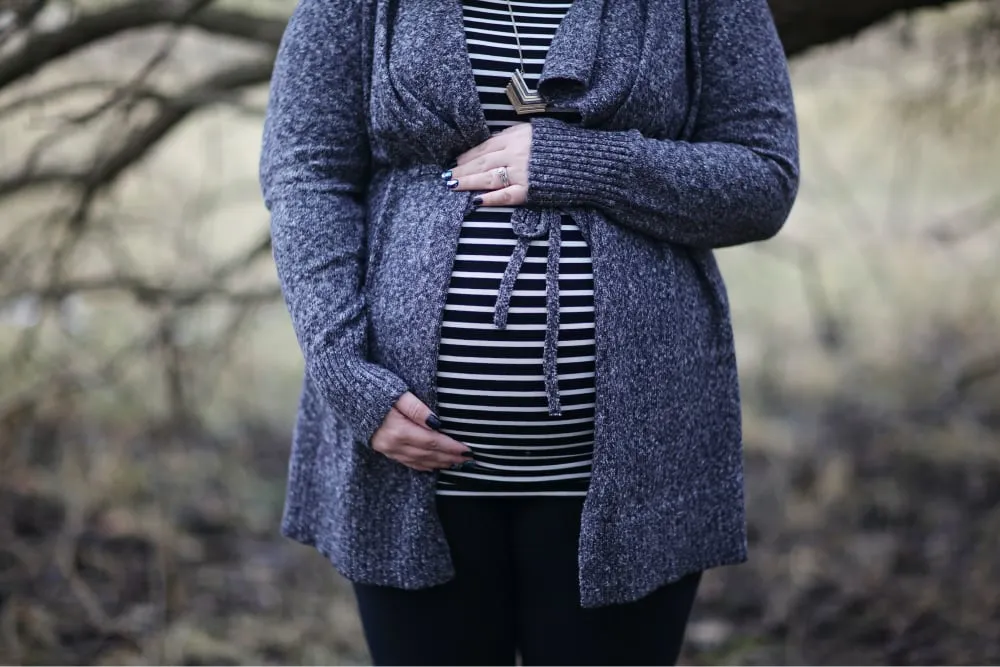Research is limited and results could be skewed by pregnant people being unwilling to admit they’re struggling with an eating disorder. However, some estimates suggest - including subthreshold disorders - 5 to 8 % of women are affected with an eating disorder while pregnant (1). Due to lack of research and recognition that transgender and non-binary folks also can become pregnant as well as struggle with eating disorders there is a lot of unknown information in this area.
This article will go through what you can expect if you have bulimia during pregnancy, how the eating disorder may affect you and your baby, the impact the condition may have on fertility, and some tips on maintaining a healthy body image during pregnancy.
Can bulimia affect pregnancy?
During pregnancy, your growing baby receives all its nutrients from your body. Therefore, you need to consume enough calories to support your fetus’ development, and this means that you’re going to gain weight. For those with body image issues, a history of eating disorders, or who are currently struggling with bulimia nervosa, this can be very frightening.
This can result in the development or resurgence of disordered eating behaviors, to attempt to exert self control over a changing body and the negative emotions and thoughts associated with weight gain. Bulimia is characterized by binging on an abnormally large quantity of food, followed by purging behavior, such as self-induced vomiting, excessive exercise, or diuretic or laxative use. (2)
The disordered eating behaviors of bulimia can result in serious medical complications, including gastrointestinal issues, cardiovascular problems, reduced immune function, and more. Therefore, the health of both parent and child can be at risk during pregnancy.
The combination of medical complications of bulimia and nutritional deficiencies can increase a pregnant person’s chance of: (2,3,4)
- Placenta previa, which is when the placenta attaches low in the uterus, partially or completely covering the cervix, which can cause severe bleeding in the mother, before, during, or after birth.
- Preterm labor, defined as delivery before 37 weeks of pregnancy. The earlier a premature birth, the greater the health risk for the baby.
- Pregnancy-induced hypertension, which can result in poor fetal growth and placental abruption i.e. premature detachment of the placenta from the uterus.
- Low or high birth weight
- Requiring a cesarean delivery
- Developing diabetes during their pregnancy
- Miscarriage
Bulimia influences on pregnancy
Let’s take a look at some of the ways that the disordered eating behaviors of bulimia can influence the health of parent and child.
Under-nutrition
Pregnancy increases the body’s needs for protein, hydration, vitamins, minerals, and overall calorie intake. However, for a person suffering from bulimia, their food intake can be inconsistent, which prevents both parent and baby from getting the appropriate amount of nutrition.
Malnutrition during development can have a huge impact on the fetus, affecting its metabolic programming throughout its life. Furthermore, research indicates that under-nutrition during pregnancy increases fetal exposure to maternal cortisol, which is associated with lower birth weight. (4)
Stress of the birth parent
People with bulimia often experience increased levels of distress and anxiety related to their disordered eating behaviors, which are only heightened by their pregnancy status. Studies have indicated that prenatal stress impacts fetal neurodevelopment, behavior, and stress response. (5)
Increased levels of stress hormones - such as cortisol - in the parent cause prenatal stress, which is known to impact birth weight, adult cardiovascular outcomes, and cognitive development. (5)
Dehydration
Regular episodes of self-induced vomiting, and/or use of diuretics and laxatives can lead to dehydration. Dehydration during pregnancy can lead to lower levels of amniotic fluid, which can influence the fetus’ development, result in preterm labor, and even affect the production of breast milk (6).
Furthermore, dehydration can also contribute to the deficiencies of nutrients that are essential to the health of the parent and the developing baby. (6)
If you’re pregnant and struggling with bulimia
If you’re pregnant and suffering from bulimia, consider taking the following steps to support yourself and your baby: (7)
- Speak honestly with your prenatal healthcare provider regarding your struggle with disordered eating behaviors. Extra appointments may be necessary to monitor the growth and development of your baby.
- Consult a registered dietitian who specializes in eating disorders to create a balanced eating plan for and throughout your pregnancy.
- Seek counseling and support groups during and after your pregnancy to help you cope with your fear surrounding food, weight gain, body image, and parenthood.
- Enroll in pregnancy and parenting classes which will help prepare you for what is to come and boost your confidence.
- Allow regular weigh-ins and measurements, which are essential for tracking the health of your baby. If you’re uncomfortable with this, ask your prenatal health provider not to share the measurements with you.
Having bulimia and wanting to be pregnant
If you are currently struggling with bulimia, or have body image issues and want to get pregnant, it may be advisable to delay pregnancy and seek treatment for your eating disorder. Following treatment, you’ll feel stronger and healthier, and be better prepared for the challenges of pregnancy and parenthood.
If you have a history of bulimia, speak with your health professionals about your history of eating disorders and your concerns before trying to conceive.
Fertility and bulimia
Often those suffering from bulimia can have irregular periods, which can affect the ability to conceive. (1) However, research has shown that fertility problems are not more common in women with bulimia nervosa. (8)
Tips for maintaining a healthy body image during and after pregnancy
Pregnancy is a time when the body undergoes some significant changes, which can be difficult for anyone and exceptionally stressful for those with a history of eating disorders. Even if your bulimia symptoms improve during pregnancy, concerns about body shape and weight gain are likely to remain.
Many people struggle with pregnancy-related weight gain, particularly when their pregnancies seem to invite increased comments from people about their changing bodies. Here are some tips that can help you maintain a positive body image during pregnancy: (7,10,11)
- Ditch the scales: While regular weigh-ins are necessary during your pregnancy, if you’re struggling with weight gain, it’s a good idea to toss the scales at home during pregnancy.
- Learn about pregnancy: Discover why weight gain is not just normal but vital for a healthy pregnancy. Learn how your baby is growing through each trimester to help you accept the changes in your body.
- Get some gentle exercise: A great way to shift your focus away from body image is to get some gentle exercise, like going for a swim or a walk in your favorite park.
- Don’t compare yourself: It’s so easy to compare yourself with others who are pregnant or even to old photos of yourself. If you get caught in the comparison trap consider limiting your screen time and blocking triggering accounts.
- Be kind to yourself: The changes in your body can seem frightening if you just regard them in terms of size and weight. Instead, try and remember the amazing thing your body is doing…growing another life. Embrace these changes by repeating body positive affirmations and doing something nice for yourself, like a massage.
The bottom line
Many people with bulimia are embarrassed or afraid to admit their disordered eating behaviors, but not doing so can increase the risk to you and your unborn baby.
It’s important to remember that your eating disorder is not a choice. Bulimia is a serious mental illness and there is nothing to be ashamed of, so reach out to your healthcare providers and let them know what you’re going through. You’ll benefit from the additional support and education on the importance of eating enough during pregnancy.




























